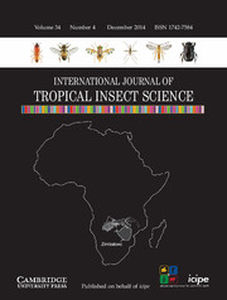Article contents
Natural Enemies of Certain Tea Pests Occurring in Southern India
Published online by Cambridge University Press: 19 September 2011
Abstract
In southern India, the principal tea pests such as the mites, Acaphylla theae, Calacarus carinatus and Oligonychus coffeae; the thrips, Scirtothrips bispinosus; the aphid, Toxoptera aurantii; and the caterpillars, Caloptilia theivora, Homona coffearia and Cydia leucostoma are attacked by many natural enemies. H. coffearia is efficiently controlled by the ichneumonid, Phytodietus sp., and the tachinid, Palexorista solennis, whilst the eulophid, Sympiesis dolichogaster, affords excellent regulation of C. theivora. The braconid, Apanteles aristaeus, is the chief parasitoid of C. leucostoma, but the efficiency of this species is rather low. The aphiidids, Aphidius colemani, Lipolexis scuttellaris and Trioxys indicus, and several species of coccinellids and syrphids exert tremendous influence on the populations of T. aurantii. No natural enemies of the scolytid stem borer, Xyleborus fornicatus, could be recorded. For the management of mites, pesticides are applied regularly and the widespread usage of broad spectrum acaricides such as dicofol and sulphur is an important reason for the low incidence of predatory mites in tea fields.
Résumé
Dans l'Inde du sud, les pestes principales du thé les acariens, A. theae, C. carinatus et O. coffeae; le thripse, S. bispinosus; l'aphide, T. aurantii; et les chenilles, C. theivora, H. coffearia et C. leucostoma sont attaguées par beaucoup d'ennemis naturels. H. coffearia est controlé effectivement par l'ichneumonide (Phytodietus sp.) et le tachinide. Palexorista solennis, tandis que l'eulophide, S. dolichogaster donne un excellent control de C. theivora. Le braconide, A. aristaeus est le parasitoid principale de C. leucostoma, mais l'éfficacité de cette éspèce est plutôt en bas. Les aphidides, A. colemani, L. scutellaris et T. indicus et beaucoup d'autres éspèces de conninellides et syrphides ont une grande influence sur les populations de T. aurantii. Cependant on n'a pas fus retronver les ennemis naturels de scolytide, Xyleborus. À controler les acariens, des pesticides sont appliquées regulièrement. L'usage génèral de dicophol et soufre est une raison importante pour la basse incidence des acariens prédatoires dans les jardins du thé.
- Type
- Research Article
- Information
- International Journal of Tropical Insect Science , Volume 9 , Issue 5 , October 1988 , pp. 647 - 654
- Copyright
- Copyright © ICIPE 1988
References
REFERENCES
- 19
- Cited by


